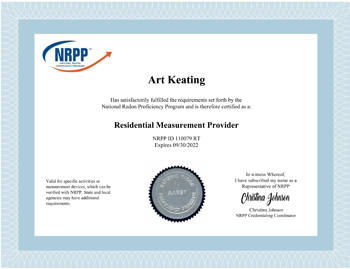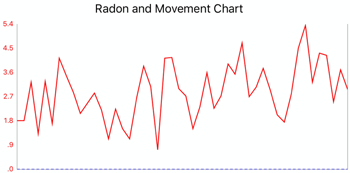RADON & WATER TESTING
Radon Testing
One in eight homes in Vermont has unsafe levels of radon. Radon is a naturally-occurring radioactive gas that has no color, smell or taste. It is present in nearly all soils and is found in the air we breathe every day. Radon comes from the natural decay of uranium. Uranium will decay to radium and eventually radon.
The problem occurs when radon gas enters your home and gets trapped. Breathing air with radon will increase your risk of lung cancer. This risk is multiplied for smokers. As radon decays into radioactive particles they can damage lung tissue and lead to lung cancer over a person’s lifetime. The EPA estimates that radon caused lung cancer kills around 21,000 Americans every year.
Any home can have elevated radon levels regardless of age, condition or design. It depends on how your home interacts with the surrounding soil. Radon levels in your home can vary significantly from your neighbor’s home. Testing is the only way to know if your home has unsafe radon levels.
Vermont Home Inspection Services provides radon testing utilizing a continuous radon monitor. This test method provides an overall average in addition to a 48-hour graph to better understand variances.
The Corentium Pro continuous radon monitor utilizes passive radon diffusion chamber to detect alpha spectrometry with a measurement range of 0–2700 pCi/L. Results are available immediately at the conclusion of the test period.
Testing can be done as part of a home inspection or a stand alone service.
Water Testing
Vermont Home Inspection Services can provide coliform/E.coli bacterial testing on any public or private water supply. This test is used to evaluate both drinking water quality and safety. The total coliform/E.coli test is used to simultaneously detect if any coliform bacteria and E. coli are present in your drinking sample. VTHIS will provide the actual count of coliform and E. coli bacteria.
The presence of E. coli in drinking water is serious because these bacteria are usually associated with sewage or animal waste.
Coliform is a group of bacteria found in soil and intestines of warm blooded animals, including humans. The bacterial may not be harmful themselves, but their presence indicates that disease-causing agents may be present in the water.
The Vermont Department of Health recommend the following testing schedule to ensure that your drinking water is safe:
- Total coliform bacterial test every year
- Inorganic chemical test every five years
- Gross alpha radiation screen every five years
Testing can be done as part of a home inspection or as a stand alone service.


